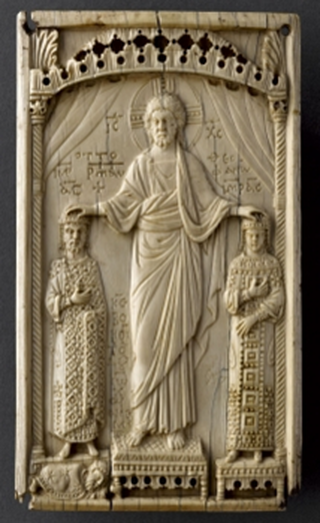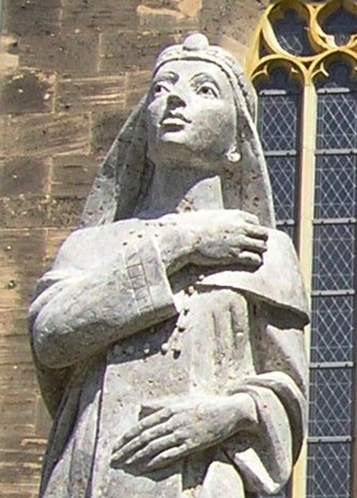 Christ Blessing the Emperor Otto II and Empress Theophano, ca . 980 CE, Ivory, Musee national du Moyen Age, Thermes et hotel de Cluny, Paris
© Bibliothèque nationale de France Cl. 392.
Christ Blessing the Emperor Otto II and Empress Theophano, ca . 980 CE, Ivory, Musee national du Moyen Age, Thermes et hotel de Cluny, Paris
© Bibliothèque nationale de France Cl. 392.
St. Theophana, 956/8-991
Ancestral Roots Line 147:20
Royalty for Commoners Line 237:36S
Niece of John I Tsimices, consort to Otto II “the Great” King of Germany, daughter-in-law to St. Adelaide of Burgundy. Theophana, a name derived from medieval Greek meaning “appearance of God” was a Byzantine noblewoman educated to play a role in imperial courts, the only German empress crowned Empress and Consors Regni. She was intelligent, a delicate beauty, high-spirited, and a superb politician possessing an intimate knowledge of the intricacies of court life. She participated in her husband’s government, traveling with him and the court even during military campaigns and is mentioned in many of the emperor's formal documents, evidence of her privileged position, influence, and interest in affairs of the empire.
In 983, Otto II traveled to Rome after the death of Pope Benedict VII to participate in the election of a new pope just as Rome experienced a malaria outbreak resulting in Otto’s death at 28 years old, having reigned for just over a decade. His money and possessions were divided among the Catholic Church, the poor of the empire, his mother Adelaide and sister Matilda, and those nobles loyal to him. Otto’s death plunged his empire into a political crisis with revolts flaring up between the Slavons, Danes and Franks, all intent upon seizing the power. Three weeks after his father’s death their three year old son was crowned Otto III, King of Germany and Theophana assumed the male title of "Imperator Augustus" defending her son’s title for seven years, administering with tact and firmness. Her intelligent presence and prudent political policies quelled the dissent which did not surface again until after her death. A contemporary called her "a woman of discreet and firm character...with truly masculine strength.”
Ancestral Roots Line 147:20
Royalty for Commoners Line 237:36S
Niece of John I Tsimices, consort to Otto II “the Great” King of Germany, daughter-in-law to St. Adelaide of Burgundy. Theophana, a name derived from medieval Greek meaning “appearance of God” was a Byzantine noblewoman educated to play a role in imperial courts, the only German empress crowned Empress and Consors Regni. She was intelligent, a delicate beauty, high-spirited, and a superb politician possessing an intimate knowledge of the intricacies of court life. She participated in her husband’s government, traveling with him and the court even during military campaigns and is mentioned in many of the emperor's formal documents, evidence of her privileged position, influence, and interest in affairs of the empire.
In 983, Otto II traveled to Rome after the death of Pope Benedict VII to participate in the election of a new pope just as Rome experienced a malaria outbreak resulting in Otto’s death at 28 years old, having reigned for just over a decade. His money and possessions were divided among the Catholic Church, the poor of the empire, his mother Adelaide and sister Matilda, and those nobles loyal to him. Otto’s death plunged his empire into a political crisis with revolts flaring up between the Slavons, Danes and Franks, all intent upon seizing the power. Three weeks after his father’s death their three year old son was crowned Otto III, King of Germany and Theophana assumed the male title of "Imperator Augustus" defending her son’s title for seven years, administering with tact and firmness. Her intelligent presence and prudent political policies quelled the dissent which did not surface again until after her death. A contemporary called her "a woman of discreet and firm character...with truly masculine strength.”
|
At her castle Quedlinburg she maintained a brilliant court attended by scholars of great note. Theophana was criticized for her decadence which manifested in her daily bathing and introducing luxurious garments and jewelry into Germany. Both she and her cousin Maria Argyrou are credited with introducing the fork to Western Europe. Chronographers mention the astonishment caused when she "used a golden (ancient Roman) double pronged instrument to bring food to her mouth" instead of using her hands, as was the norm. At her death Otto III was still a child resulting in grandmother Adelaide of Burgundy taking over until he was old enough to rule on his own. Chronicler Thietmar eulogized her as follows: "Though [Theophanu] was of the weak sex she possessed moderation, trustworthiness, and good manners. In this way she protected with male vigilance the royal power for her son, friendly with all those who were honest but with terrifying superiority against rebels.” Historians have called her one of the greatest women in world history.
|

Read her letters: https://epistolae.ctl.columbia.edu/woman/26.html
References and Further Reading
References and Further Reading
- Brownworth, Lars. Lost to the West: The Forgotten Byzantine Empire That Rescued Western Civilization. Random House, 2009.
- Connor, Carolyn L. Women of Byzantium. Yale University Press, 2004.
- Jackson-Laufer, Guida M. Women Who Ruled: A Biographical Encyclopedia. Barnes & Noble Books, 1998.
- Koman, Alan J. A Who’s Who of Your Ancestral Saints. Genealogical Publishing Co., 2010.
- Medieval Women’s Latin Letters https://epistolae.ctl.columbia.edu/women.
- “Regent Dowager Empress Theophano of the Holy Roman Empire .” Worldwide Guide to Women in Leadership, Women in Power 750-1000, Female leaders and women in other positions of political authority of independent states and self-governing understate entities. Web. 06 December 2014. //www.guide2womenleaders.com/womeninpower/Womeninpower03.htm.
